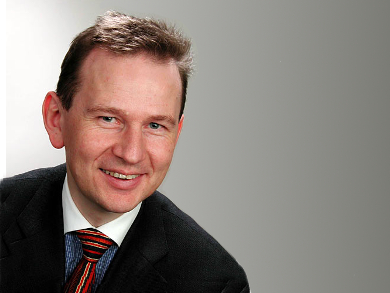Professor Matthias Beller, Leibniz-Institut für Katalyse (LIKAT), Rostock, Germany, has been awarded the Emil Fischer Medal by the German Chemical Society (Gesellschaft Deutscher Chemiker, GDCh) on September 16, 2014. The award was presented during the ORCHEM organic chemistry conference in Weimar, Germany.
The Emil Fischer Medal recognizes outstanding work in the field of organic chemistry.
Matthias Beller studied chemistry at Georg-August-Universität, Göttingen, Germany, where he finished his PhD in organic chemistry in 1989. After a postdoctoral stay with K. B. Sharpless at the Massachussetts Institute of Technology (MIT), Cambridge, MA, USA, he worked in research at Hoechst AG for five years. In 1996, he became Associate Professor for inorganic chemistry at the Technical University of Munich, Germany, and in 1998 Full Professor at the University of Rostock, Germany. Since 2005, he is director of the Leibniz-Institut für Katalyse e.V. (LIKAT), Rostock.
Among others honors, Professor Beller has been awarded the Leibniz-Preis of the Deutsche Forschungsgemeinschaft (DFG) and the European Sustainable Chemistry Award. He is a member of the “Deutsche Akademie der Naturwissenschaften Leopoldina” and of the Akademie der Wissenschaften (Academy of the Sciences), Hamburg, and has been vice president of the Gottfried Wilhelm Leibniz Scientific Association (Leibniz Association) since 2012. He is chairman of the Editorial Board of ChemSusChem, a member of the International Advisory Board of ChemCatChem, as well as a member of the Editorial Board of Angewandte Chemie.
His research focuses on important aspects of homogeneous catalysis, especially of transition metal-catalysts, aiming for the development of new, environmentally benign catalysts and synthetic protocols as well as their application in industry.
Current activities include iron-catalyzed oxidations and hydrogenations, hydroformylations, hydroaminomethylation and hydroamination, Pd- and Cu-catalyzed cross-coupling reactions, and Rh- and Ru-catalyzed asymmetric hydrogenations.
Selected Publications:
- Convenient and Mild Epoxidation of Alkenes Using Heterogeneous Cobalt Oxide Catalysts,
Debasis Banerjee, Rajenahally V. Jagadeesh, Kathrin Junge, Marga-Martina Pohl, Jörg Radnik, Angelika Brückner, Matthias Beller,
Angew. Chem. Int. Ed. 2014, 53, 4359–4363.
DOI: 10.1002/anie.201310420 - A General Catalytic Hydroamidation of 1,3-Dienes: Atom-Efficient Synthesis of N-Allyl Heterocycles, Amides, and Sulfonamides,
Debasis Banerjee, Kathrin Junge, Matthias Beller,
Angew. Chem. Int. Ed. 2014, 53, 1630–1635.
DOI: 10.1002/anie.201308874 - Metal-Initiated Amination of Alkenes and Alkynes,
Thomas E. Müller, Matthias Beller,
Chem. Rev. 1998, 98, 675–704.
DOI: 10.1021/cr960433d - Palladacycles as Structurally Defined Catalysts for the Heck Olefination of Chloro- and Bromoarenes,
Wolfgang A. Herrmann, Christoph Brossmer, Karl Öfele, Claus-Peter Reisinger, Thomas Priermeier, Matthias Beller, Hartmut Fischer,
Angew. Chem. Int. Ed. Engl. 1995, 34, 1844–1848.
DOI: 10.1002/anie.199518441 - Progress in hydroformylation and carbonylation,
Matthias Beller, Boy Cornils, Carl D. Frohning, Christian W. Kohlpaintner,
J. Mol. Catal. A: Chem. 1995, 104, 17–85.
DOI: 10.1016/1381-1169(95)00130-1




